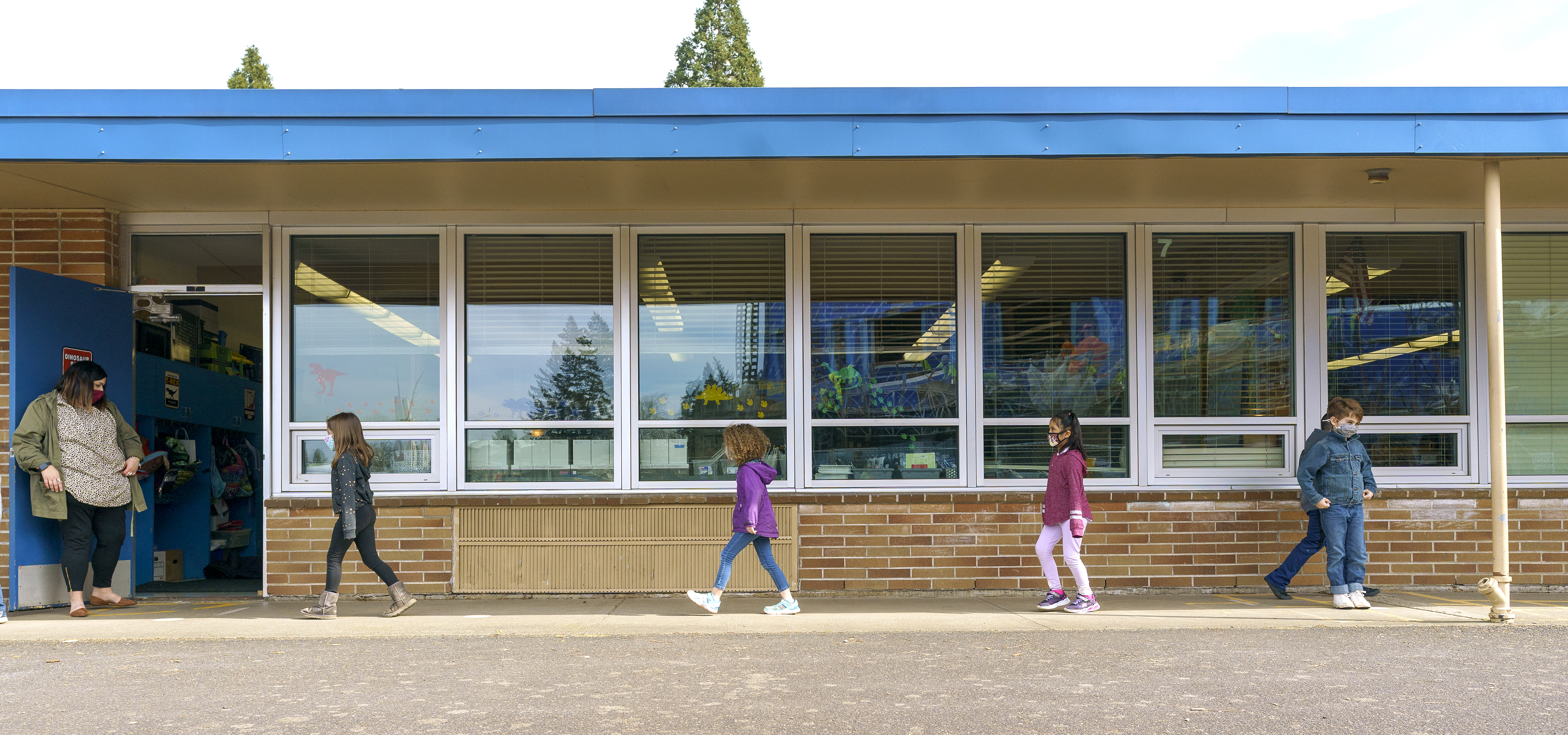
Students at Ellsworth Elementary School in Vancouver, Wash., wear masks as they walk between classrooms and the library in this file photo from March 1, 2021.
Kristyna Wentz-Graff / OPB
Vancouver science teacher Cheyenne Montgomery meets regularly with the “Climate Justice League,” a group of teachers around Washington working on climate curriculum.
When the group met last Wednesday, Montgomery said, several teachers were shaken, especially in the aftermath of a school board meeting in Camas. They spoke of parents threatening teachers, and deriding the district’s mask and equity policies.
“People were noticeably more upset and worried about their personal safety,” Montgomery said.
Parents of both former and current Camas students spoke during the public comment part of the May 10 in-person meeting. In violation of school district COVID-19 protocols, several took off their masks to speak as they complained about the district.
One parent, Daisy Thompson, said there was an “agenda” being pushed in schools, and that masks were being used to silence students.
“It’s time to remove the masks from our children’s faces to allow them to have oxygen for their brain to think,” Thompson said.

Daisy Thompson, a Camas parent, in a screen shot of video from her public comments at the district's May 10 school board meeting. Thompson was among several parents who complained about the district's COVID-19 policies and curriculum.
YouTube screenshot
Other parents railed against the district’s equity work and accused the district of “teaching racism.” Critical race theory, an academic framework that has been around for decades, was mentioned by several parents, both in-person at the board meeting and through written public comment. Recently, the phrase has been used, mainly by conservatives, to curb conversations about racism and equity, with several states passing legislation to limit classroom discussions about race.
But some parents expressed frustration beyond critical race theory. They mentioned sex education and discussions of gender identity, including pronoun use, as reasons for removing their students from the district. As they spoke, others in the room cheered.
Another parent threatened to release teacher information online if the district continues to deliver a “subpar education” and to enforce COVID-19 safety measures like distancing and masks.
“I am giving you the opportunity to correct this before I begin publicly posting the school, grade and teacher or staff member’s name where this is happening,” the parent, Lindsay Biggin, said. ”I know we are all aware of how powerful social media is.”
Shelley Houle, a teacher and president of the Camas Education Association, the local teachers’ union serving over 460 members, said she was the only educator at the meeting. She said she had an administrator walk her to her car because there was a group of parents standing outside after the meeting ended.
“I wasn’t worried about my physical safety but more, being a target,” Houle said.
She said several of her members watched the meeting online and expressed concern.
The school district said this week it will issue “very direct rules” regarding public comments and mask-wearing protocols during board meetings. Camas will continue the in-person meetings.
In nearby Washougal, the school district shared a statement detailing the disruptions and COVID-19 policy after a board meeting there the day after the one in Camas. While acknowledging the importance of public comment, the board also stressed the importance of following safety measures.
“When community members refuse lawful requests to vacate the board room and district property, and seek to disrupt the orderly business of the board, the board will seek support from local law enforcement, who will force non-compliant community members to leave,” according to the statement.
The board said it had to recess and then adjourn the meeting “in response to a continued interruption that had escalated to vandalism of the District Office building and the personal vehicles of board members and school district staff.”
And parents aren’t just showing up to board meetings. They’re showing up and influencing classrooms directly, too.
In the last year, Vancouver teacher Cheyenne Montgomery has had two moments that reflect the current political environment. During one virtual class in the fall, during a lesson on scientific misinformation and how to identify it, she said one parent started yelling at her, calling her a communist. In another instance, a parent expressed frustration with an assignment about the environmental justice movement but, after communicating with Montgomery, understood the assignment and its purpose.
“It’s stressful to be yelled at, it feels terrible, it’s stressful to have parents attack you for who you are,” Montgomery said.
Montgomery is openly gay and said in the past she’s been attacked by parents for it. This year, she’s been quieter about her sexual orientation out of fear of being attacked again. She said it’s a loss for students who may not get to see themselves reflected in their teachers.
As a teacher, she said the potential of interacting with angry parents is always there, especially when it comes to teaching topics like evolution and climate change — topics that are backed by science, but still controversial to a group of people.
COVID-19 has been like that, too. Last year, her students wanted to talk about COVID-19, so they did, watching news clips and discussing the federal government’s response. This year, she said, the student interest is still there, but she’s aware of the potential to anger parents or a political group by just discussing it.
Montgomery said the group of teachers she’s a part of doesn’t just share ideas — they offer support to each other to continue teaching in spite of threats to their safety.
“They’re starting to threaten to dox teachers, and that becomes very frightening,” Montgomery said, referring to the practice of sharing private individual’s identifying information online.
“It does make you consider ... shying away from topics that are going to upset the wrong people, and that’s a huge disservice to our students.”


